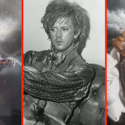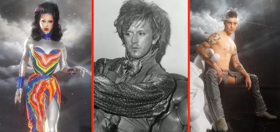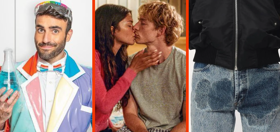 The announcement was as surreal as it was unsettling. In the summer of 1985, former movie star Doris Day announced that she was coming out of retirement to host a new show, Doris Day’s Best Friends, a half-hour, Christian-network program featuring celebrities chatting about their pets and what their four-legged companions mean to them.
The announcement was as surreal as it was unsettling. In the summer of 1985, former movie star Doris Day announced that she was coming out of retirement to host a new show, Doris Day’s Best Friends, a half-hour, Christian-network program featuring celebrities chatting about their pets and what their four-legged companions mean to them.
But talk of pets was soon upstaged by the press conference’s special guest. Day had recruited her old friend and rom-com co-star Rock Hudson to appear to help plug the show. As the two announced they would reunite for the first episode of Doris Day’s Best Friends, Hudson, gaunt and seemingly exhausted, clung to his co-star, doing his best to appear as though this was simply another routine promotional event. For a moment, Hudson seemed confused, stumbling for words. He leaned heavily into Day. She appeared to be holding him up.
 Though the word “AIDS” was not mentioned during the press conference, Hudson’s dramatic physical state effectively confirmed the rumors that had been circulating in the Hollywood community for months: Rock Hudson, former leading man and box-office box office draw, had AIDS. In the ensuing months, Hudson would become the public face of the epidemic, the first American public figure to acknowledge having the disease — then, of course, considered, at best, both a stigma and a death sentence. Suddenly, the disease had a far greater sense of familiarity — the epidemic had found the celebrity it needed to become a cause celebre, for the media to represent the disease as something killing people Americans knew, rather than just a Gay Plague. Elizabeth Taylor, one of Hudson’s oldest friends and a former co-star, swore she would not rest until there was a cure for the disease. A great deal of the stigma surrounding the disease had been lifted, and a new sense of urgency set in about finding treatments, a vaccine and perhaps even a cure.
Though the word “AIDS” was not mentioned during the press conference, Hudson’s dramatic physical state effectively confirmed the rumors that had been circulating in the Hollywood community for months: Rock Hudson, former leading man and box-office box office draw, had AIDS. In the ensuing months, Hudson would become the public face of the epidemic, the first American public figure to acknowledge having the disease — then, of course, considered, at best, both a stigma and a death sentence. Suddenly, the disease had a far greater sense of familiarity — the epidemic had found the celebrity it needed to become a cause celebre, for the media to represent the disease as something killing people Americans knew, rather than just a Gay Plague. Elizabeth Taylor, one of Hudson’s oldest friends and a former co-star, swore she would not rest until there was a cure for the disease. A great deal of the stigma surrounding the disease had been lifted, and a new sense of urgency set in about finding treatments, a vaccine and perhaps even a cure.
And it may be difficult to imagine now, as treatments for HIV and AIDS have changed as significantly as public attitudes towards it have, but in ’85, much of the world was gripped in an AIDS panic. Prominent conservative and National Review editor William F. Buckley had advocated tattooing any who tested HIV positive, ignoring the Third Reich overtones, as he suggested this way people would know who to avoid sexual contact with. A Los Angeles Times poll revealed a slim majority of Americans favored a quarantine for people who had AIDS.
How about we take this to the next level?
Our newsletter is like a refreshing cocktail (or mocktail) of LGBTQ+ entertainment and pop culture, served up with a side of eye-candy.
 If Hudson’s death from AIDS was to change people’s perception of the disease, it would also forever change how people would see Rock Hudson, and what being gay looked like. Suddenly, the star Look magazine once declared “smelled of milk” was no longer the straight man. People magazine quoted Hudson’s aunt Lela as saying, “Never would we think that he would be that. He was just always such a good person.”
If Hudson’s death from AIDS was to change people’s perception of the disease, it would also forever change how people would see Rock Hudson, and what being gay looked like. Suddenly, the star Look magazine once declared “smelled of milk” was no longer the straight man. People magazine quoted Hudson’s aunt Lela as saying, “Never would we think that he would be that. He was just always such a good person.”
The San Francisco-based author Armistead Maupin, a former lover of Hudson’s and a long-time friend of the screen star, began to speak very openly about Hudson’s hidden personal life and his relationships. Maupin’s friendship with Hudson would certainly seem odd — Hudson signifies a life spent in the closet, a gay reality only exposed when fatal disease left no other option. Maupin, on the other hand, authored the hugely popular Tales of the City newspaper serials-cum-best selling books, in which an ensemble of gay and straight characters peacefully and colorfully co-exist in a San Francisco apartment complex. The books, and Maupin’s steadfast refusal to allow a Hollywood studio to translate them for the big screen while heterosexualizing his gay characters, have made him something of a hero in the gay and lesbian community. (In the ’90s, the books would eventually be turned into several TV miniseries, gay characters left as Maupin had intended them.) Maupin has always preached that honesty about one’s sexual orientation is a crucial priority for gays, and a prerequisite for true gay liberation.
Maupin’s tales of Hudson led some in the gay community to argue that he was in fact betraying his old friend. Critics contended that Maupin’s candidness simply did not reflect the intensely private nature of the late actor. Maupin fired back in a series of interviews. In 1987 he told America’s national gay and lesbian magazine The Advocate, “It seemed to me that someone had to say that Rock had nothing to be ashamed of. There were people who regarded that as a betrayal on my part; I saw it as going to bat for him. If Rock himself had seen it as a betrayal he certainly wouldn’t have asked his biographer to speak to me.” Maupin also pointed out that Hudson’s sexual orientation was what was referred to in Hollywoodese as an “open secret” — most people in Tinseltown knew about it anyway.
 If perceptions around AIDS had been altered, the outing of Rock Hudson meant that his body of work had also forever changed. Watching a film starring the square-jawed hero with the new knowledge of his homosexuality — and given the massive amount of publicity surrounding his cause of death, that knowledge was effectively universal — had become something entirely different. Hudson had made a series of melodramas with the director Douglas Sirk, for example, in which restrictive sexual mores lead to misery and torture for the film’s central characters. In particular, Hudson made All That Heaven Allows, a film in which the actor plays a lower-class gardener whose relationship to the older, upper-class widow Jane Wyman (notably, then married to Ronald Reagan) is threatened due to their class and age difference. Despite the film ostensibly being about a heterosexual romance, it clearly resonated with gay audiences, given its eerily authentic depiction of suffocating sexual repression. (Not surprisingly, All That Heaven Allows has since been essentially remade by two gay directors, Rainer Werner Fassbinder and Todd Haynes.)
If perceptions around AIDS had been altered, the outing of Rock Hudson meant that his body of work had also forever changed. Watching a film starring the square-jawed hero with the new knowledge of his homosexuality — and given the massive amount of publicity surrounding his cause of death, that knowledge was effectively universal — had become something entirely different. Hudson had made a series of melodramas with the director Douglas Sirk, for example, in which restrictive sexual mores lead to misery and torture for the film’s central characters. In particular, Hudson made All That Heaven Allows, a film in which the actor plays a lower-class gardener whose relationship to the older, upper-class widow Jane Wyman (notably, then married to Ronald Reagan) is threatened due to their class and age difference. Despite the film ostensibly being about a heterosexual romance, it clearly resonated with gay audiences, given its eerily authentic depiction of suffocating sexual repression. (Not surprisingly, All That Heaven Allows has since been essentially remade by two gay directors, Rainer Werner Fassbinder and Todd Haynes.)
 But also of note were the fluffy romantic comedies that Hudson made with Day. British critic Richard Dyer pointed to a number of comic sequences within the Hudson-Day collaborations in which Hudson’s character pretended to be gay to tease Day. The result, Dyer pointed out, made for a complex interpretive hall of mirrors: “Here is this homosexual (Roy Scherer Jr, Rock’s real name) pretending to be this straight man (Rock Hudson) who’s pretending to be a straight man (the character in the film) pretending to be a queer (for the sequence or gag in the film).”
But also of note were the fluffy romantic comedies that Hudson made with Day. British critic Richard Dyer pointed to a number of comic sequences within the Hudson-Day collaborations in which Hudson’s character pretended to be gay to tease Day. The result, Dyer pointed out, made for a complex interpretive hall of mirrors: “Here is this homosexual (Roy Scherer Jr, Rock’s real name) pretending to be this straight man (Rock Hudson) who’s pretending to be a straight man (the character in the film) pretending to be a queer (for the sequence or gag in the film).”
This shift in thinking on a figure as iconic as Hudson led to an odd hope in the gay community. I use the word odd because using the word hope in relation the AIDS epidemic was basically unthinkable at that point in time. Larry Kramer, himself an Oscar-nominated screenwriter, had famously already likened AIDS to a contemporary version of the Holocaust in which homosexuals were the victims, creating the phrase “SILENCE = DEATH.” In large urban centers like New York, San Francisco, Los Angeles, London and Toronto, vast numbers of gay men were dying in their prime years. Many held that there could be no silver lining to AIDS, and to suggest that there might be was heretical.
 But some went as far as to suggest just that: now that Hudson had been outed, and given the massive cultural sway that Hollywood studios have, perhaps the average American would simply have to realize what homosexual activists had been preaching for years: that gays are everywhere, come in all shapes and sizes — are ‘us’ rather than ‘them.’ Perhaps now Hollywood screenwriters would think to represent gay and lesbian characters differently. Considering all the media attention Hudson’s illness and subsequent death procured, Tinseltown — the place Elizabeth Taylor once famously suggested wouldn’t exist without Jews or homosexuals — was due for a seismic shift in consciousness.
But some went as far as to suggest just that: now that Hudson had been outed, and given the massive cultural sway that Hollywood studios have, perhaps the average American would simply have to realize what homosexual activists had been preaching for years: that gays are everywhere, come in all shapes and sizes — are ‘us’ rather than ‘them.’ Perhaps now Hollywood screenwriters would think to represent gay and lesbian characters differently. Considering all the media attention Hudson’s illness and subsequent death procured, Tinseltown — the place Elizabeth Taylor once famously suggested wouldn’t exist without Jews or homosexuals — was due for a seismic shift in consciousness.
 To be sure, the fight for more accurate movie and television representations of gay and lesbian people — dubbed ‘positive images’ — had been established long before Hudson’s revelations. In 1981, American film critic Vito Russo would write the first edition of The Celluloid Closet, an exhaustive account of the depictions of homosexuals in American cinema. There were various conclusions: Gays and lesbians were treated with abject homophobia by Hollywood; Europe was ahead of the game, being more progressive on gay issues; and television often dealt more honestly with homosexuality than the big screen did. But the book’s most jarring evidence was its concluding section, a Necrology that detailed the way in which homosexual characters were skewered, mutilated, shot, burned or had committed suicide by the final credit roll in a number of prominent Hollywood films. “Hollywood is too busy trying to make old formulas hit the jackpot again to see the future,” Russo stated in his book’s concluding sentences. “This will change only when it becomes financially profitable, and reality will never be profitable until society overcomes its fear and hatred of difference and begins to see that we’re all in this together.” (Russo himself would die of AIDS in 1990.)
To be sure, the fight for more accurate movie and television representations of gay and lesbian people — dubbed ‘positive images’ — had been established long before Hudson’s revelations. In 1981, American film critic Vito Russo would write the first edition of The Celluloid Closet, an exhaustive account of the depictions of homosexuals in American cinema. There were various conclusions: Gays and lesbians were treated with abject homophobia by Hollywood; Europe was ahead of the game, being more progressive on gay issues; and television often dealt more honestly with homosexuality than the big screen did. But the book’s most jarring evidence was its concluding section, a Necrology that detailed the way in which homosexual characters were skewered, mutilated, shot, burned or had committed suicide by the final credit roll in a number of prominent Hollywood films. “Hollywood is too busy trying to make old formulas hit the jackpot again to see the future,” Russo stated in his book’s concluding sentences. “This will change only when it becomes financially profitable, and reality will never be profitable until society overcomes its fear and hatred of difference and begins to see that we’re all in this together.” (Russo himself would die of AIDS in 1990.)
 Beyond any reasonable doubt, the ability of homosexuals to live openly, honestly and freely — at least in the western world — has improved dramatically in the past two decades. Whether Hollywood has played a part in this larger shift in public consciousness by pushing forward the normalization of gay and lesbian characters or was just reflecting broader social evolution is still the subject of debate. Along with those changes has come a shift in Hollywood casting calls: now, heterosexual actors are no longer afraid to take on gay roles for fear of being identified as gay themselves. This has brought major star power to LGBT characters and, by extension, the issues that affect them.
Beyond any reasonable doubt, the ability of homosexuals to live openly, honestly and freely — at least in the western world — has improved dramatically in the past two decades. Whether Hollywood has played a part in this larger shift in public consciousness by pushing forward the normalization of gay and lesbian characters or was just reflecting broader social evolution is still the subject of debate. Along with those changes has come a shift in Hollywood casting calls: now, heterosexual actors are no longer afraid to take on gay roles for fear of being identified as gay themselves. This has brought major star power to LGBT characters and, by extension, the issues that affect them.
The shift has come in attitudes towards the epidemic, albeit very slowly, in part due to further revelations about public figures who have HIV. Since Hudson, there have been many — from Liberace to Isaac Asimov to Magic Johnson — and the public disclosure ritual has changed too. Witness the interview Charlie Sheen gave to Matt Lauer on Today but two weeks ago. The ultimate bad boy Sheen, whose persona is the antithesis of that of wholesome Hudson’s, was met with many empathetic and sympathetic email responses from viewers, which Lauer read to him. The breakfast TV audience response seemed one mired in redemption rather than condemnation. There was little prurient curiosity — at least on the surface — and no so-how-did-you-get-it question.

Important to note that Hudson’s death was not the only event that rocked the boat in 1985. In fact, it was something of a watershed year for the virus and the culture it inspired. The movie-of-the-week An Early Frost aired on American network TV, in which a gay man, his boyfriend and family grappled with the news that he had AIDS. Larry Kramer’s play The Normal Heart debuted off-Broadway, in which the playwright recounted his struggles with the burgeoning disease, a tone deaf New York City government and apathetic gay men. And Canadian filmmaker Nik Sheehan would direct the first documentary response to AIDS, No Sad Songs, in which he attempted to counter the increasingly common media representation of a person with AIDS as hapless victim.
 But in retrospect, Hudson’s revelation seemed the most shocking, and the one that sticks. It is downright weird the influence celebrity culture has on audiences. It is a one-way looking glass: we don’t know the stars we see on screen, but we think we do. If Hudson had the disease, a Life magazine cover concluded at the time that “now no one is safe.” And stranger still that we would look to movies to make sense of our world — they are, after all, merely an imitation of life. But we do.
But in retrospect, Hudson’s revelation seemed the most shocking, and the one that sticks. It is downright weird the influence celebrity culture has on audiences. It is a one-way looking glass: we don’t know the stars we see on screen, but we think we do. If Hudson had the disease, a Life magazine cover concluded at the time that “now no one is safe.” And stranger still that we would look to movies to make sense of our world — they are, after all, merely an imitation of life. But we do.
If there is one profound irony that hangs over the legacy of the cause of Hudson’s death, it is that the institution that has arguably changed the least since 1985 is Hollywood itself. There have been obvious breakthroughs: the Oscars have now been hosted by an out lesbian (Ellen DeGeneres) and gay man (Neil Patrick Harris). There are many more actors who are completely open about their sexual orientation or gender identity, including Ian McKellen and Ellen Page.
But for the A-list male actors, the truth remains universally acknowledged: heterosexuality, or the appearance of heterosexuality, is imperative. This has created a strange paradox: actually being gay for an actor who aspires to be a leading man is taboo, but actors (and their agents) know full well that if straight actors do take on LGBT roles, they stand a very good chance of winning an Oscar. It has worked for William Hurt (Kiss of the Spider Woman), Tom Hanks (Philadelphia), Hillary Swank (Boys Don’t Cry), Charlize Theron (Monster), Sean Penn (Milk) and Jared Leto (Dallas Buyer’s Club). So playing gay is fine, but avoid being gay.
For a city famous for being ultra-liberal, Hollywood is slow to change. Armistead Maupin once told me we had come a long, long way in terms of the public’s perception of popular actors. I pointed out that we still don’t have out men on the Hollywood A-list. He thought about it for a moment, and then said, “You’re right. Back then we had Rock Hudson and Montgomery Clift. Now we have the Church of Scientology.”
One of the final sentences in Russo’s book The Celluloid Closet haunt me to this day: “Hollywood is yesterday, forever catching up tomorrow with what’s happening today.”
Matthew Hays is a Montreal-based writer whose articles have appeared in The Guardian, The New York Times, Vice, The Washington Post and The Advocate. He is the author of The View from Here: Conversations with Gay and Lesbian Filmmakers (Arsenal Pulp Press), which won a 2008 Lambda Award. He teaches film studies at Marianopolis College and Concordia University



















Kangol
Public perceptions about people with HIV and AIDS (PWAs) have certainly improved since Rock Hudson’s illness received public notice, but we still have a long way to go.
Remember that Charlie Sheen hid his HIV status for something like two to four years, and while there hasn’t been the sort of hysteria around his disclosure that once would have been common, there also hasn’t been much public discussion about HIV transmission, safe sex, etc. that there could be now that he is out–as an HIV positive man.
It would be great for Queerty to focus a bit more on HIV prevention, and perhaps have tributes to LGBTIQ people we’ve lost to AIDS over the years. So many people died in the 1980s and 1990s, many of them seeing promising careers and lives end overnight. HIV and AIDS are still with us, so why not remind us of some of these amazing people as we go forward in the 21st century?
KentonForshee
@Kangol: Charlie Sheen’s response of hiding it for 4 years is understandable. Given that manic episode in his life that so publicly put him on every news and tabloid just prior to that, and the fact that people mostly like to learn to cope privately, and I think we should give him that. He had a lot of self importance to swallow. The fact that he came forward, yes there’s all that blackmail going on, but still he did it.
Sand Nierenberg
He was a absolutely gorgeous man and yes it better I would welcome anyone with hiv or AIDS in my home in a minute why not I wouldn’t give it s second thought it’s sad some people from differently about that in this day and age
Stache
@Kangol: They also posted a story on HIV prevention activists today.
Cagnazzo82
The picture of him as an old man and a young man almost look like two different people altogether.
Sad.
I’m thankful that terrible era has passed.
Joe
Rock’s death of AIDS put a real face to this disease – a complete turning point on how AIDS was perceived. In a strange way, he is a hero of the disease at the most critical time.
Desert Boy
I love Rock Hudson. Who can forget him ‘Giant’ with Elizabeth Taylor or ‘Magnificent Obsession’ with Jane Wayne or the comedies with Doris Day? Rock Hudson was a genuine movie star and drop-dead gorgeous.
Rock Hudson passed away before I was born. Everything I’ve read about his fight with HIV/AIDS is heart-wrenching. Medical treatment was non-existent then. Like so many others, he just withered away and died. So sad.
His friendship Doris Day revealed something profound about her character. She refused to shun him. She’s a class act.
Cagnazzo82
@Desert Boy: As the saying goes, you can really tell who your friends are when the chips are down. Not necessarily when they’re up.
People like Doris Day and Elizabeth Taylor were class acts. They’re the type who stand by you when you fall down and need a hand up.
Massive respect for those women.
Also Rock Hudson was before my time, but I really find him attractive. He’s such husband material. Wish he’d found someone nice and settled down before the whole HIV/AIDS crisis took hold.
Unfortunate.
CWM85
Rock added a face to disease but he was no hero. He was forced to acknowledge he had aids or else the hospital was going to kick him out because they lied why they were being treated in first place. But this was 39 years ago, rock new he was going tRock added a face to disease but he was no hero. He was forced to acknowledge he had aids or else the hospital was going to kick him out because they lied why they were being treated in first place. But this was 39 years ago, rock new he was going to die and said, “give it to the dogs.” The closet was finally open to everyone, Hollywood knew. Rock was very open about it, living with men. They had to fight to keep him in the closet because he was very open about it even in early 1950s. The media wasn’t like it is now. People didn’t try to out you like now. It was everyone’s secret. Rock would have been 90 if he lived. He was not a great actor but he was very good in giant, Pillow talk, seconds. He was very handsome and charming.o die and said, “give it to the dogs.” The closet was finally open to everyone, Hollywood knew. Rock was very open about it, living with men. They had to fight to keep him in the closet because he was very open about it even in early 1950s. The media wasn’t like it is now. People didn’t try to out you like now. It was everyone’s secret. Rock would have been 90 if he lived. He was not a great actor but he was very good in giant, Pillow talk, seconds. He was very handsome and charming.
Juanjo
Rock Hudson was no hero and his homosexuality was not any real secret either in San Francisco or LA. He would attend parties in LA not to mention fly to San Francisco where he would visit night spots and the baths. It was Middle America which did not know. The people like my mother who still watches Pillow Talk and smiles all the way through it.
Rock was outed when he could not hide his disease any longer. His friends stood by him and they were the heroes. He tried to pass stories about liver cancer and other nonsense before finally being forced to admit what was known to all. If he had been able to muster up the cajones to stand up sooner, he might have been a highly respected speaker on an issue which was causing immense amounts of suffering in the gay community. Virtually every friend I have from that time period is gone and all before their time. He was a part of the problem them although his death helped make things easier for others. But that was because of others like Elizabeth Taylor and Doris Day among others.
natriley
Hat’s off, what a great story. I was surprised it happened in 1985, I thought it was later. But we followed Rock Hudson’s last weeks, desperate trip to Paris, and it did create a public change in mood. I had no idea Doris Day was there for him. The staging of this announcement shows that Rock Hudson did meet his obligation to the HIV community. Hudson was mocked mercilessly by his directors and catty people of all sexual orientation. He had a lot of dignity and did his job well. I was not an admirer until, dare I say, I looked at the whole picture.
lykeitiz
I lost my best friend to AIDS in 1995. I knew him from the time we were in 2nd grade up until his death, 2 weeks shy of his 30th birthday. He was more like a brother than a friend.
Losing him seems like yesterday. Like anyone who has lost someone can tell you, there are some memories you just file away. It isn’t until I read an article like this that I realize just how many years have passed, and that there is actually a generation who didn’t live through this, who only know what they read or hear.
This article is so well written. The spin it puts on the purpose Rock’s death had on the equality movement is a reminder that some stories should always be told.
Doughosier
What an era to grow up in! I was 19 when I first heard of AIDS, which it wasn’t yet called. It was a copy of US magazine with Matt Dillion on the cover. ( I lusted after him) There was an article about a new gay cancer. When Rock Hudson collapsed in a hotel lobby in Paris it was big news. Then the confirmation came. There was so little info back then on how to get it. I wouldn’t even kiss a guy because I was afraid. Glad I survived.
pattygale
I’m old so I remember Rock Hudson very well and how it broke my heart to know that he had to hide his true self all those years. I was thrilled when Adam Lambert came out at the start of his career. Did it hurt him? Maybe, but he lives his life out and proud, paving the way for those who, 6 years later, aren’t asked about their sexuality by every friggin’ interviewer. Anyway, more progress is needed but we’ve come a long way.
scotshot
I remember that Hudson was vilified in the press and public. A major hero in this whole scenario is Elizabeth Taylor. She brought the conversation to a higher level than it was previously. At the time no one in Hollywood stood up for Hudson – or anyone else with HIV/AIDS and she bravely did. She gave her time and money when she didn’t need to. ET has done more than anyone else in raising awareness of this horrible disease. I honestly believe that many more would be dead today if Miss Taylor had not stood up.
Qwrangler
This excellent account of those years reminded me of the importance of telling our stories. We don’t have LGBT families or churches that pass down our history, so each of our generations has to do it. It was hard to smile those days and I lost my partner of 18 years. Keeping our history alive and our authors writing is even more important as we become mainstream with its pressures to slip into mediocrity. I for one, don’t want to lose those special qualities and history that make me queer.
Alistair Wiseman
Jane Wyman had already divorced Ronald Reagan in 1949 before “All That Heaven Allows” was released in 1955. In fact, Ron had already married Nancy Davis in 1952 a couple of years before the Wyman/Hudson movie was released.
Brian
I’m sorry but if you are having anonymous sex in bath-houses with every Tom, Dick or Harry, I find it difficult to sympathize with you. Think about the choices you are making. You want to have fun? Think of other ways to have fun.
I understand that the male sex drive is a very powerful thing. It is so powerful, it drives men to have promiscuous encounters with total strangers. At some point, however, you need to decide what is best for you. The body isn’t an impenetrable fortress – never has been. Through history, there have been millions and millions of people who have been struck down by bacteria, viruses or protozoa that have wreaked havoc on the human body.
I don’t want to be prejudiced towards Rock but life is all about choices – we make good choices but we also make bad choices. Bad choices can have consequences that last for a very, very long time.
Stache
@Brian: Can you fuck off please? This isn’t another soapbox moment for you troll.
o.codone
Fritz Holt was friends with Rock Hudson through various Hollywood-New York connections. Holt had a boyfriend, Barry Brown, and the two of them managed stars and produced numerous, successful Broadway shows.
Brown met executive, Robert Schnell at an promo event. Schnell owned and operated several companies including one called “Gay Movers”, which was, yes, a gay moving company. They moved theatrical equipment. Diego da Silva, a Portuguese bomb-shell with a dick like a pony, worked for Schnell and was involved in his personal life because da Silva kept Schnell happy in the sex department.
Before long Barry Brown had his own 15 minutes of fame with da Silva and promptly called Hudson to tell him what he had found (between da Silva’s legs). Hudson, a size queen himself flew to NY’s St. Regis Hotel for an inevitable hook-up. IDK what went on precisely, but the party lasted about 5 days and Hudson bottomed as best he could. There were others involved and basically it was a 5 day orgy, something that Hudson was familiar with.
Then suddenly, da Silva passed away, pneumonia. All the phones lit up with concern, even panic. The AIDS test was new and it took a month to get the results back. But Hudson got the bad news anyway. He blamed Brown and da Silva and started to blacklist Brown. Holt took the high road and insisted that any one of the men involved, including Hudson could have been person zero. It didn’t have to be da Silva, it could have been any one of them.
There are pictures of da Silva, taken before photoshop, on Fire Island. I think it was 1980. He was definitely a freak, but so attractive because all his features were perfect. He was really young, smooth, had an unquestionable uncut 12 inches. A dream come true for Hudson. IDK how that thing fit into Hudson’s azz, esp since it was known that Hudson was not a drug user. I could go on, but you get the picture.
Scary times in NYC. This vignette is part of my upcoming book about the social impact of the early days of the AIDS epidemic. If I can get it published.
slckp
This is a thoughtful and well written memoir of the 80’s. Too bad most of the young readers on this site won’t read it because they have never heard of Rock Hudson. They will never understand the pain and suffering of the LGBT community in those days. The brave heroes like Kramer and the Rock who brought this disease to the forefront of America instead of the angry backlash that was happening to the community. This disease could have brought our community to it’s death. Americans wanted us to die and to be out of their lives. My very own brother called AIDS “Gods revenge on Gays”. But the heroes and the many brave volunteers who I was able to work along side of brought this community to it’s best fighting militia. We demanded justice, we demanded equality. It brought civil rights into our fight. As thousands of people died many started to fight. It worked. We forced the governments into helping us. We brought LGBT awareness to the forefront. Rock Hudson was truly our hero when he came out. As the author stated, he made Americans realize that people living with AIDS were not “someone they didn’t know”. Now they had a face, a loved face, to relate to. This changed everything.
Thank you for writing such a wonderful, thoughtful, accurate article. Thank you for publishing it Queerty.
Brian
@Stache: Who are you to judge? Don’t like it, don’t read it. Simple, isn’t it?
Doughosier
@o.codone: Your book sounds fascinating. I want to see a picture of da Silva!